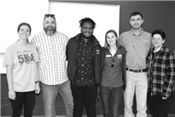|
LSU Students Hear About Innovations In Agriculture

Steven Ward, second from left, is a Bayer Scientific Fellow and the senior director of geospatial
sciences at The Climate Corporation, based in San Francisco. He is an alumnus of the LSU College
of Agriculture and spoke to students during the College of Agriculture Alumni Speaker Series.
Also pictured are students Kaylee Boswell, Elijah Hanzy III, Ainsleigh Thibodeaux, Noah Harper and Katie Costanza.
BATON ROUGE, LA.
As farm tractors across the globe move through fields, small sensors about the size of a hockey puck gather hundreds of thousands of data points – soil moisture, engine torque, down-force planting pressure and the speed at which a farmer is driving the equipment.
This is agriculture in the digital age.
But what do farmers do with all this data? That is where Steven Ward comes in.
Ward, an alumnus of the LSU College of Agriculture, is a Bayer Scientific Fellow and senior director of geospatial sciences at The Climate Corporation based in San Francisco.
He spoke on the LSU campus as part of the LSU College of Agriculture Alumni Speaker Series and presented a lecture to LSU AgCenter faculty and the public.
“Farmers look at the data, and they don’t always know how to interpret it. They know there is a story in there, but it isn’t always easy to decipher,” Ward said.
The Climate Corporation with its FieldView technology is helping farmers make sense of the data and giving them the ability to make data-driven decisions on their farms to increase crop yields while reducing inputs such as chemicals and water.
With population growing at an exponential rate and the declining availability of arable land, technology must make advances in agriculture, Ward said.
Farming has seen these advances before. Mechanization and biotechnology have revolutionized agricultural production in the past. Data science is the new revolution, and Ward is at the forefront.
Ward was born in Lafayette, Louisiana, but raised in London, England. He returned to Louisiana to attend LSU, first receiving a bachelor’s degree in environmental management systems, then a master’s degree in agronomy and a doctorate in geography with a focus on spatial statistics.
He spent time with consulting firms in the environmental sector, doing everything from endangered species research to natural disaster response. Through these positions, he gained experience in computer sciences and geosciences, which enhanced his background in crop management.
“I was unknowingly building up a skillset that is sought after in digital agriculture,” he said. Ward joined The Climate Corporation four years ago.
Ward has seen a shift in the jobs being advertised by big agricultural companies like Bayer, which acquired The Climate Corporation five years ago. He said they are now looking for as many data scientists and statisticians as more traditional agricultural scientists such as plant breeders or crop production and management specialists.
Students interested in the field of digital agriculture need three core skills: expertise in an agriculture field such as plant pathology, entomology or soil sciences; an understanding of basic statistics or applied math; and the ability to write computer code.
The Climate Corporation, which started with a weather prediction focus before moving to more agricultural modeling, is receiving data from more than 40 million connected acres and expects the number to jump significantly this year. The company hopes to reach 100 million small-hold farmers worldwide by 2030, Ward said.
“In even the most remote Third World environments, farmers have access to smartphones,” he said. The Climate Corporation is using apps to help farmers in countries such as India, where farmers can, for example, connect with the company to get crop production advice.
The Climate Corporation technology and data deciphering work best with traditional row crops such as corn, soybeans and wheat, but Ward hopes to help growers of other crops.
While in Louisiana, Ward met with sugarcane farmers. Sugarcane is grown, harvested and managed differently than other row crops, and yield sensing in sugarcane harvesters is still in its infancy. The Climate Corporation is looking for ways to bring their services to farmers of this perennial crop, he said. ∆
|
|